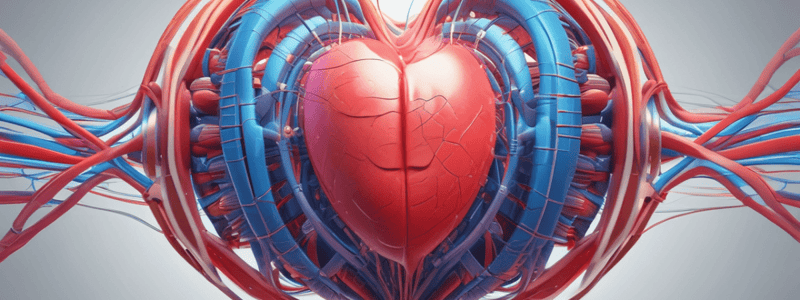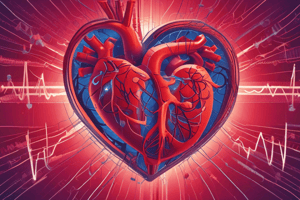Podcast
Questions and Answers
Which part of the nervous system is primarily responsible for regulating heart rate under resting conditions?
Which part of the nervous system is primarily responsible for regulating heart rate under resting conditions?
- Posterior hypothalamus
- Cerebral cortex
- Respiratory center
- Vagal tone (correct)
Which of the following reflexes is responsible for the increase in heart rate due to increased venous return?
Which of the following reflexes is responsible for the increase in heart rate due to increased venous return?
- Carotid sinus syndrome
- Bainbridge reflex (correct)
- McDowal's reflex
- Marey's Law
According to Marey's Law, what is the relationship between heart rate and arterial blood pressure?
According to Marey's Law, what is the relationship between heart rate and arterial blood pressure?
- Heart rate is exponentially related to arterial blood pressure
- Heart rate is independent of arterial blood pressure
- Heart rate is directly proportional to arterial blood pressure
- Heart rate is inversely proportional to arterial blood pressure (correct)
Which of the following is the correct pathway for the Bainbridge reflex?
Which of the following is the correct pathway for the Bainbridge reflex?
Which part of the hypothalamus is responsible for stimulating the Cardiac Acceleratory Center (CAC) and increasing heart rate?
Which part of the hypothalamus is responsible for stimulating the Cardiac Acceleratory Center (CAC) and increasing heart rate?
What is the effect of deep inspiration on heart rate according to the text?
What is the effect of deep inspiration on heart rate according to the text?
What is the mechanism by which stimulation of the carotid sinus baroreceptors can lead to bradycardia?
What is the mechanism by which stimulation of the carotid sinus baroreceptors can lead to bradycardia?
Which of the following is a direct mechanism by which the respiratory center can influence heart rate?
Which of the following is a direct mechanism by which the respiratory center can influence heart rate?
What is the effect of sympathetic stimulation on the heart?
What is the effect of sympathetic stimulation on the heart?
Which of the following statements about heart rate is true?
Which of the following statements about heart rate is true?
Which factor does NOT contribute to physiological variations in heart rate?
Which factor does NOT contribute to physiological variations in heart rate?
Which of the following statements about the regulation of heart rate is true?
Which of the following statements about the regulation of heart rate is true?
Which of the following heart rates would be considered bradycardia?
Which of the following heart rates would be considered bradycardia?
What is the typical heart rate for an infant?
What is the typical heart rate for an infant?
Which of the following factors contributes to a lower heart rate in athletes?
Which of the following factors contributes to a lower heart rate in athletes?
What is the primary mechanism by which the autonomic nervous system regulates heart rate?
What is the primary mechanism by which the autonomic nervous system regulates heart rate?
What is the effect of voluntary contraction of skeletal muscles on heart rate?
What is the effect of voluntary contraction of skeletal muscles on heart rate?
Which of the following accurately describes the effect of hypoxia (low oxygen) on heart rate?
Which of the following accurately describes the effect of hypoxia (low oxygen) on heart rate?
Which hormone is associated with an increase in heart rate?
Which hormone is associated with an increase in heart rate?
What is the effect of applying pressure on the eyeball (oculo-cardiac reflex) on heart rate?
What is the effect of applying pressure on the eyeball (oculo-cardiac reflex) on heart rate?
How does moderate hypercapnia (increased carbon dioxide) affect heart rate?
How does moderate hypercapnia (increased carbon dioxide) affect heart rate?
Which of the following substances causes bradycardia (decreased heart rate)?
Which of the following substances causes bradycardia (decreased heart rate)?
What is the approximate increase in heart rate for every 1°C rise in body temperature?
What is the approximate increase in heart rate for every 1°C rise in body temperature?
Which of the following is NOT a factor that regulates heart rate?
Which of the following is NOT a factor that regulates heart rate?
Flashcards are hidden until you start studying



